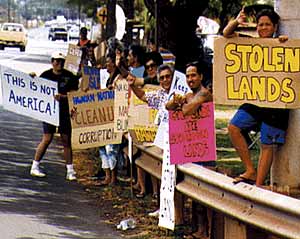22.05.2008
May 20, 2008 (the date of publication in Russian)
Alexei Chichkin, Alexander Rublev
APOLOGIES ARE INSUFFICIENT
Attaining recognition of illegitimate annexation, Hawaiian natives demand independence
 On May 1, 2008, campaigners for independence of the Hawaii archipelago, crowding around Iolani, the former royal palace in Honolulu, declared that this building would now host the Hawaiian Kingdom Government headed by Mahealani Kahau, the heiress of the monarchic dynasty that had ruled the isles until 1898. The self-proclaimed queen was removed from the place only with assistance from FBI officials who launched an investigation of the "anti-American action".
On May 1, 2008, campaigners for independence of the Hawaii archipelago, crowding around Iolani, the former royal palace in Honolulu, declared that this building would now host the Hawaiian Kingdom Government headed by Mahealani Kahau, the heiress of the monarchic dynasty that had ruled the isles until 1898. The self-proclaimed queen was removed from the place only with assistance from FBI officials who launched an investigation of the "anti-American action".
The Iolani palace is located at one of the most picturesque areas of Honolulu and known as a major place of interest. In fact, it symbolizes the statehood of Hawaii that existed in the XIX century.
The efforts of the United States to feature itself as the herald of freedom of the whole humanity stumble over "skeletons in the cupboard" of the continent's history that now tend to revive. North American Indians remind of decades of policy under the motto "a good Indian is a dead Indian"; Mexicans cannot forgive secession of Texas; Afro-Americans still hold grudges over the record of segregation and slavery. The indigenous population of the Hawaii is one more community to raise ethnic claims.
Despite the measures, undertaken by Washington for assimilation of the indigenous population of the islands, they managed to retain historical memory and national identity, though the percentage of the natives has shrunk to from 85 to 19.2%, while only around 3000 persons regard Hawaiian as their mother language. The problem, however, is determined not with the number of the "dissidents" but with the unpleasant charges they address to the United States.
In 1840-1850s, The Kingdom of Hawaii was regarded as highly developed, according to that time's criteria. It was recognized by major European powers, and its baptized leaders (the Bible was translated into the Hawaiian language in 1826), establishing a parliamentary rule, and developing education and health care, did not look like savages that required "enculturation to civilized life" by means of colonial pressure.
Moreover, in the third quarter of the XIX century the Hawaii state was a more advanced nation than Japan. However, the United States ignored these civilizational conventionalities, and deployed its troops to the isles in order to integrate them into their empire. Until the onset of World War I, Hawaian lawyers sent lots of letters to the White House, trying to reason the occupying power, but their efforts were in vain. The United States behaved with the Hawaii in the same time as France did with Madagascar and Britain with Burma, which at the time of annexation also had an internationally recognized status of sovereign states. The same could happen with Ethiopia, but the colonial overtake of this country was prevented by Russia's diplomatic intervention.
While Madagascar and Burma have since liberated themselves from colonial dependence, the movement for Hawaiian independence was crushed in 1948, when the insurrection on the Maui isle was oppressed by the US administration. Since 1960s, Hawaiian activists have preferred legal forms of struggle, using connections in the Democratic Party for achieving official recognition of illegitimacy of the islands' annexation in 1898. This effort eventually brought success: on November 23, 1993, President Bill Clinton signed Resolution 103-105, by which the United States officially apologizes for the deposition of the Hawaiian royal dynasty.
By this move, the Democratic Party achieved sympathies in the population of the islands. At the same time, Washington was seeking to close the unpleasant page of history, as the issue of Hawaiian independence was reflected not only in diplomatic intercourse but also in literature. For instance, Robert Louis Stevenson dedicated verses to the charming Hawaiian princess Victoria Kaiulani (Victoria Kawekiu Lunalilo Kalaninuiahilapalapa Kaiulani Cleghorn), a young lady who spoke English, German and French, and strived for independence of her nation until her untimely death in the age of 23.
Still, Washington’s repentance was conditioned with a legal provision stating that Resolution 103-105 cannot serve as grounds for political claims. Today, Hawaiian political activists reject this provision, insisting on re-establishing of an independent Hawaiian monarchy.
Princess Mahealani Kahau claims that the indigenous population of the islands has become a "showcase", a glossy magnet for American and international tycoons without achieving any rights. Kuhio Vogeler, a Hawaiian political activist, recently visited Lithuanian to study the experience for the Baltic States in their struggle for independence from the USSR.
Thus, the 1959 Captive Nations Week Resolution, accusing the Soviets of occupying 22 lands including the never-existent states of Idel-Ural and Kazakia, is returning to Washington as a boomerang. If Lithuania declared itself independent on the grounds of Gorbachov's official denunciation of the Ribbentrop-Molotov pact, why can't the Kingdom of Hawaii declare independence on the grounds of Resolution 103-105, inquire the Hawaiian nationalists.
Though the promoters of independence presently comprise a minority of the islanders, the movement is expanding, involving successors of Chinese and Japanese colonists, along with some White Saxon residents of the Hawaii.
Number of shows: 1162
 ENG
ENG 

 ENG
ENG 
